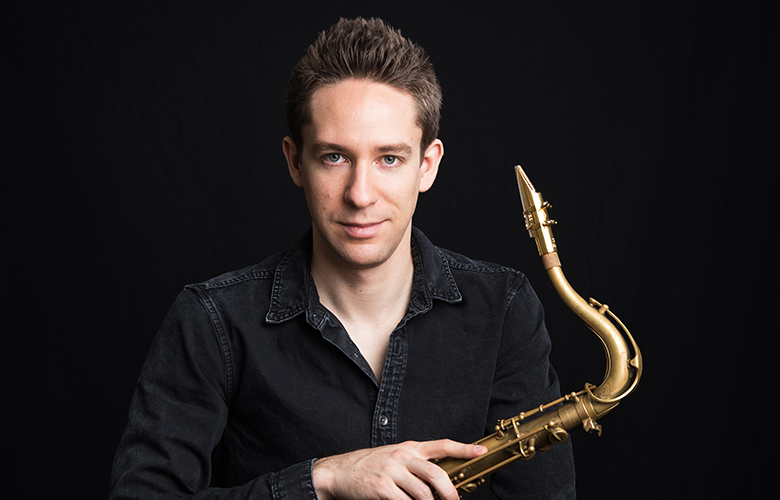
TheatreArtLife caught up with Ben Harrison, a musician, composer and band leader currently on tour with Cirque du Soleil. Originally from Adelaide, Australia, Ben tells us of his journey into his musical career, the best and worst parts of his job and provides some sound advice for those seeking a similar career.
I grew up in a very musical family, and the majority of my extended family play an instrument, sing, or perform in some capacity, so my parents and grandparents highly encouraged and supported my musical development from a very young age all the way through my formative years.
I started my musical journey first on piano when I was around four years old and had the good fortune and luck through a family friend to be able to study with a wonderful Russian classical piano teacher, Inna Fursa, who was incredibly generous with her time and really helped my musical development at a young age.
I started saxophone several years later when I was about nine – I really just fell in love with the instrument from hearing it played on jazz albums that my dad often played and decided that’s what I really wanted to play. I also was extremely lucky that my grandfather owned a musical instrument store so I was able to tinker with many different instruments, such as violin, clarinet, drums, guitar and bass guitar – which has been an incredible asset to me in my career as a multi-instrumentalist.
I really never even considered becoming a professional musician as I didn’t think it was a viable or financially secure line of work. After graduating high school I commenced a double degree in Civil Engineering and Finance at the University of Adelaide; however, I dropped the engineering component after a year and instead started a Bachelor of Music Performance. This was quite an intense workload as I was still studying my finance degree concurrently and working as a musician in cover bands playing weddings and corporate gigs at night and on the weekends to help support my studies financially.
I really enjoyed my time at the Elder Conservatorium of Music, and because of previous study in high school, where I entered a special-interest music program on a scholarship, I received credit for the first-year components of the degree and was advanced straight to the second year of the program. Going straight to second year really helped balance my study load. However, it was socially challenging as I was joining a group of people who had already been studying together for a whole year – akin to joining a new high school mid-way through term.
That said, I made some really great personal friendships and professional connections through the course, most of whom I am still in contact with. Many of my classmates through high school and the conservatorium have gone on to have really amazing careers themselves. I was also fortunate to have some really incredible teachers there, especially my saxophone instructors Dustan Cox and Mike Stewart, who really pushed my musical development during those years.
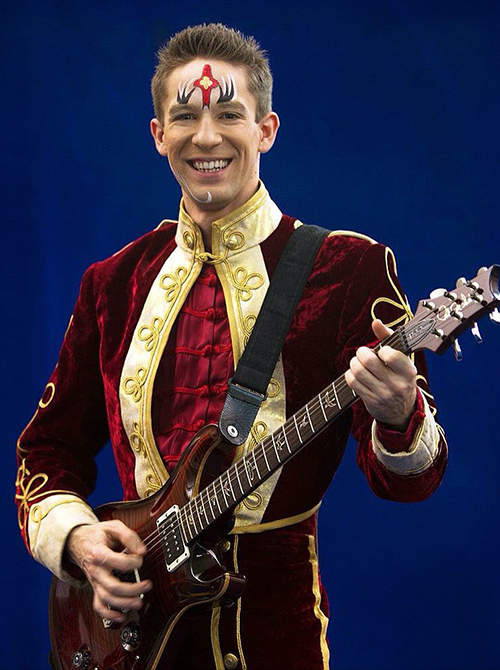
This is a strange story of coincidence and ‘the right place at the right time’. When Cirque du Soleil’s big top tour of Varekai visited Adelaide in 2007, the bandleader at the time, Raphael Sanchez, needed a new accordion for the show. It so happened that my grandfather’s music store was one of the few places in Adelaide that sold high-end accordions. So that was where he ended up purchasing an accordion for the show (and also one for himself), which he asked to be delivered to the big top.
As I was working at the store myself, I was the one who ended up delivering the accordions to the big top. Raphael was kind enough to offer to let me watch the show that night from the band pit.
After that experience, I was keen to explore job opportunities as a musician at Cirque du Soleil further, and as a result of getting to know Raphael better while the show was in Adelaide, he kindly recommended me to the Cirque du Soleil casting department. They contacted me to audition for the saxophone/keyboard position in Corteo; however, I was focused on finishing my university degrees, and I decided not to pursue the opportunity at that time.
In early 2010 though, after I had graduated with my music degree, I decided to send in a general audition tape, and it just so happened that there was a saxophone/keyboard position open on Quidam. I then auditioned for, and was offered the contract for just a few weeks later. Amazingly quite by chance, I was already going to Montreal on exchange that year to finish my finance degree at business school HEC Montreal, and by a crazy ‘the stars have aligned’ coincidence, the date of my last exam was one day before my contract with Quidam began, so I feel it was all meant to be!
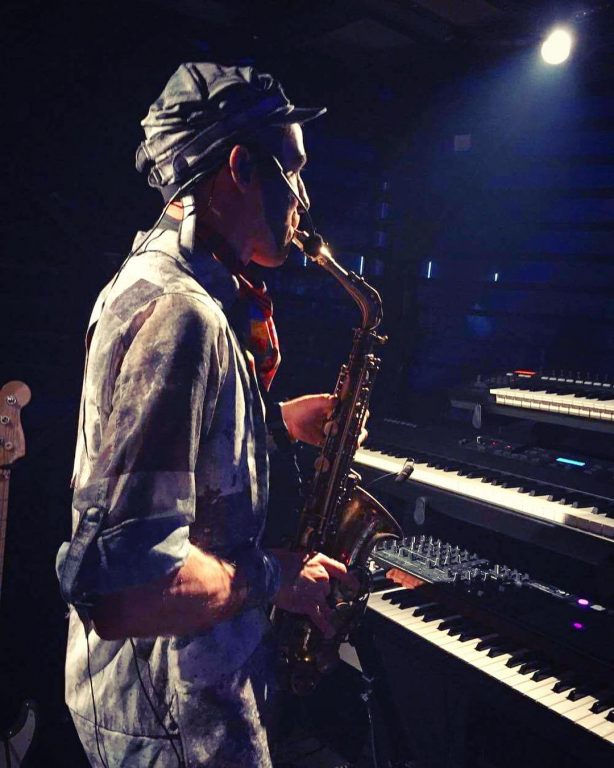
Working as a musician for Cirque is actually kind of a strange combination of all of those things and more as the music is often so diverse and different from act to act that you really need a good grounding in many different musical styles.
On the classical ensemble side, the technique, precision and consistency that you gain from performing with such ensembles is highly applicable in Cirque.
You are playing the same show every day and need to be able to deliver a consistent performance of technically challenging parts. Then on the jazz ensemble side, having the ability to listen and react to the rest of the band at a moment’s notice as well as improvise and adapt fluidly whenever the music or act requires it is important. For example, sometimes a section of an act goes longer than normal or needs to be repeated, perhaps an acrobat missed their trick and is going for a second attempt, musically we have to compensate and good improvisation skills are necessary in such a dynamic performance environment.
And lastly, having personally come from a strong choral performance background myself, this has been a huge benefit as a bandleader in being able to effectively manage the performance of vocalists by helping balance their workload and avoid vocal fatigue (10 shows a week is tough on the vocal chords!). So ultimately being a musician and bandleader with Cirque really combines and requires elements from so many musical disciplines to be able to perform well in this environment.
My favourite tour stop so far would undoubtedly have to be London, not just because I love visiting the city and its vibrant music scene but also because we were performing Kooza in the Royal Albert Hall.
When the show starts, the curtain opens and you’re looking out at several thousand people in the lush red and gold interior of this iconic and prestigious theatre – it’s just a surreal experience, and I really hope to perform there again one day.
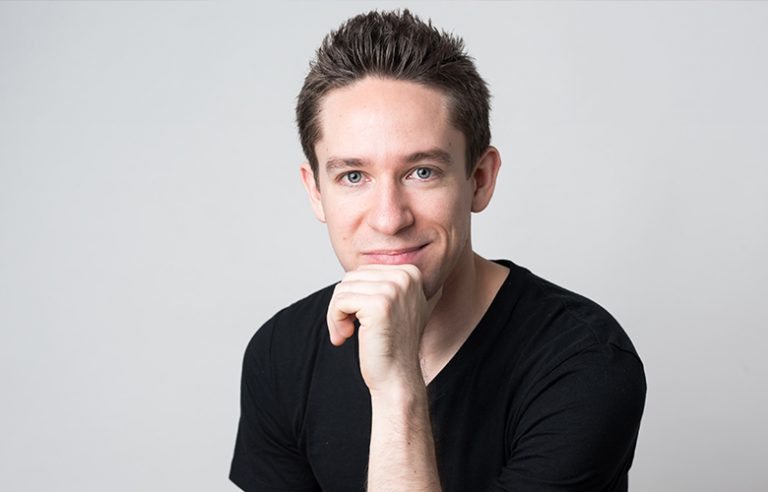
They are all such different shows musically that it’s hard to choose – but Quidam would probably be my favourite overall. Benoit Jutras’s score is so beautifully written and supports the content of the show incredibly well. Even more so, as a musician, it’s an absolute joy to play his music as the parts are really well written for the instrumentation of the band. Benoit is a former Cirque du Soleil musician and bandleader himself, so his writing ensures that every musician has their moment to shine.
One of the best sources of inspiration comes from my fellow musicians and bandmates on tour as we’re always sharing with each other whatever we’re listening to at the time, and an advantage of being around people with such varied musical backgrounds and tastes is that you become exposed to and discover a huge variety of different music. That said, you never know where inspiration will strike; as I write this, I’m in a coffee shop in downtown San Francisco, and they have some 70s J-Pop playing on the radio that is already turning over some creative cogs and generating ideas for new compositions!
My creative process is very organic and not structured at all unless I have a particular brief for a specific project/performance to achieve. It usually involves sitting down at the piano or guitar and improvising until I hear a motif or progression that I like and then workshopping it from there into a piece. Sometimes when inspiration hits me, I can write and orchestrate an immensely complex piece in just a few days, or sometimes it might take me a year or more to finish a piece. I often go back every few months and listen to older concepts and projects that I’ve recorded to see if there is anything that perhaps I wasn’t feeling at the time but I might like to develop further now into a more realized composition.
I have had an incredible musical career so far, which I could never have imagined would happen, and I will continue performing as long as I am physically able! However, I am also working on doing more on the production side of music and composing a lot more for TV/film and live shows, which is certainly a long-term process as it generally takes many years and a lot of luck to succeed as a composer in today’s competitive digital arena, but this is definitely my long-term goal, and I’ll have to wait and see where it takes me in the next few years!
Firstly, get as much experience as you can in whatever performing opportunities you can, and make sure to network with your fellow musicians as this is what can often provide a lot of musical opportunities in the future. Secondly, although it’s an often-repeated cliché – practice, practice, practice – being versatile and technically capable on your instrument(s) will help prepare you for whatever opportunities come your way. For me personally, the old adage that success is the intersection of preparation and luck has certainly proven true in my musical career so far.
Also, always keep in mind that your off-stage personality and professionalism are equally if not more important than your on-stage performance.
Your manner will have a large part to play in getting return calls for gigs or new opportunities throughout your career – so always be professional in your conduct; that is, arrive to gigs punctually and be easy to work with, prepared to play whatever part is required of you, and ready to adapt to any unforeseen changes.
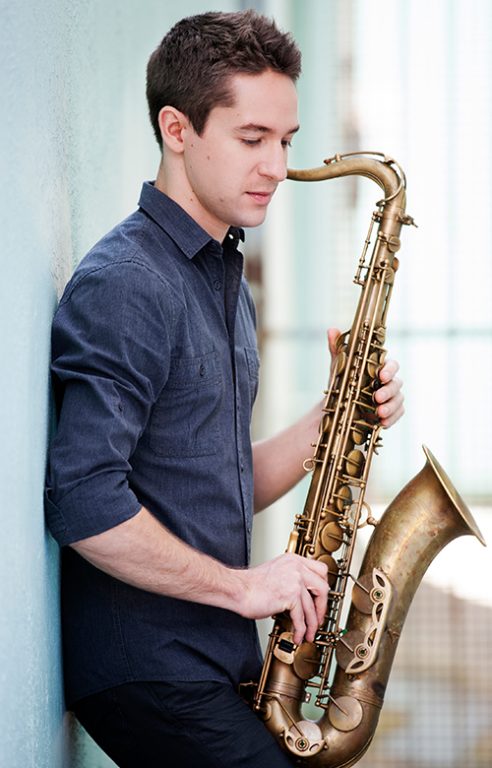
I would say for me personally, the most challenging aspect of my career as a musician has been the constant travel and nomadic lifestyle. I learned early on in my career with Cirque du Soleil that the fast-paced arena tours where you’re in a different city every few days or every week and constantly on a plane or a bus are just not for me. I personally like to travel at a slower pace, which is why I love the big top tours where you’re in a city for a few months, can settle in at a more leisurely pace, and have time to unpack your luggage.
Having mentioned living the ‘nomadic lifestyle’, at present my wife and I don’t own or rent a house (although we have several storage units in Sydney, Montreal and Rome), so not having a ‘home base’ is often a huge challenge for us from a logistical perspective, especially when dealing with the much less exciting parts of touring such as visas, tax, etc. or where to send/store our belongings. From a materialistic perspective, it means we really have to manage what possessions we own/buy as we have to carry them with us in our luggage until we next get back to one of our storage units to drop them off, which is sometimes many months away. This is also challenging when the seasons are changing and we need to swap out our summer clothing for heavier winter coats and boots, which take up more luggage space – so that is always an ongoing challenge for us.
Also, after many years on tour now, I do find that I get homesick for Australia after long periods away, especially being so far from family and friends.
It can be difficult to maintain a work/life balance with an intense show schedule, and as performers, we tend to miss a lot of other night-time activities like concerts that we’d really like to see.
That’s just another part of the trade-off for being fortunate enough to play music and travel the world for a living.
I have to confess that my least favourite part of the job is putting on make-up for shows. When I started, it would sometimes take me up to two hours, especially the original complicated make-up I had on Kooza, but now on Volta, I have it down to about 15-20 minutes, and I have to wait and see what Alegria brings next year!
A highlight of my career has been performing with my wife, Alessandra Gonzalez, who I first met on Quidam back in 2011. We’ve been together on two Cirque du Soleil shows (Quidam and Kooza) now, and that has been an incredible experience that we hope to continue with more shows together in the future.
I’ve also really enjoyed meeting so many talented artists and musicians through Cirque and other avenues on my travels. I’ve just recently recorded an album featuring several of my bandmates with whom I’ve had the pleasure to perform on Quidam, Kooza and Volta over the past several years, so on a creative level, getting acquainted with so many world-class performers has been absolutely amazing.
Ben’s Favorite Articles on TheatreArtLife:
Julie McInnes – Musician: Being Bold Matters
Opening VOLTA by Cirque Du Soleil with Johnny Kim
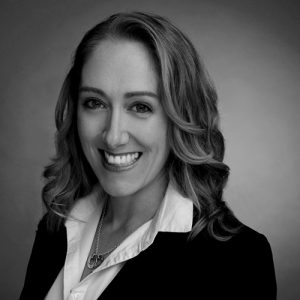

Anna Robb is Co-Founder and Managing Director for TheatreArtLife. Anna is an experienced Producer/Production Stage Manager. Her 20-year work history spans Asia Pacific, the Americas, Africa, the Middle East and Europe. She has worked for companies such as Cirque du Soleil, Franco Dragone Entertainment Group, Christie Digital Systems and The Sydney Opera House. Anna was an integral part of the research and development, training and formation, creation and operation of the 250 million dollar aquatic show, The House of Dancing Water in Macau. She also maintained the daily operations of this complex show as the head of Stage Management for 7 years. Anna has been employed on over 70 shows in the areas of concerts, arena events, corporate events, trade shows, musical theatre, plays, dance, circus, outdoor festivals and mega shows. Anna holds a honours degree in Design for Theatre and Television and is passionate about the evolution of the industry.
Read Full Profile© 2021 TheatreArtLife. All rights reserved.

Thank you so much for reading, but you have now reached your free article limit for this month.
Our contributors are currently writing more articles for you to enjoy.
To keep reading, all you have to do is become a subscriber and then you can read unlimited articles anytime.
Your investment will help us continue to ignite connections across the globe in live entertainment and build this community for industry professionals.